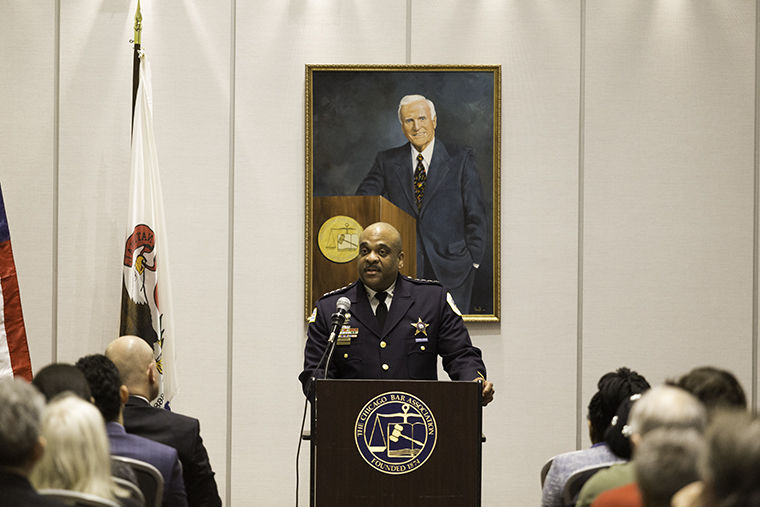CPD Superintendent shoots down Trump accusations
Chicago Police Superintendent Eddie Johnson spoke at the Chicago Bar Association’s event series on Feb. 28.
March 6, 2017
Crime rates are down 60 percent in the 7th police district and 40 percent in the 11th district since the start of 2017—which include Englewood and Harrison, two of the five most dangerous neighborhoods in the city, according to Chicago Police Department Superintendent Eddie Johnson.
“Since the beginning of the year we have seized, on average, one gun per every hour,” Johnson said at a Feb. 28 Chicago Bar Association event. “Despite the narrative out there, Chicago is not a city up for grabs by criminals.”
The CBA, a professional association for lawyers located at 321 S. Plymouth Court, hosted Johnson as a speaker in a series of events called “People You Should Know.”
Since he was appointed CPD superintendent in April 2016, Johnson said he has introduced a three-prong crime strategy with a focus on community engagement programs, data-driven policing and a solution to the flawed lack of accountability for repeat gun offenders.
During the event’s interactive portion, CBA president Daniel Kotin asked the superintendent about tweets from President Donald Trump threatening to “send in the Feds” to combat the city’s violence.
“I don’t know what [President Trump] means by ‘sending in the Feds,’” Johnson responded.
Johnson added that he appreciates scrutiny when it helps him to better serve Chicago, but law enforcement is now facing criminals “devoted” to testing the justice system’s limits, which has contributed to the city’s violence.
Johnson said he would welcome more FBI and ATF agents, and also federal funding for economic development—to create jobs and mentorship programs for parents and adolescents in impoverished neighborhoods.
“If [President Trump] means sending in the National Guard, we don’t need that,” Johnson said. “At some point, we have to stop talking about things and start doing something.”
According to Johnson, a problem facing CPD is a pattern of continuously arresting the same criminals for gun offenses, who end up back on the streets because of flaws in Illinois’ criminal justice system.
“[Chicago’s] gang members look at our judicial system as a joke, and they have told me that personally,” Johnson said.
Johnson compared the crime rates in Chicago with those in Los Angeles and New York City, the nation’s two largest cities, where Johnson said illegal possession of a gun carries much heavier consequences. New York City’s penalty for carrying an illegal weapon is a minimum of three and a half years in prison, while displaying an illegal handgun during a crime in Los Angeles can lead to 10 years in prison. The penalty is enhanced to 15 years for firing the weapon and 20 years for murder using an illegal weapon, Johnson said.
“[These cities] have managed to create a culture of accountability, and a mentality for their criminals not to even pick up a handgun,” he said.
In Cook County, first-time gun offenders spend about six months in prison and one and a half years for a second offense, according to Johnson.
Alan Borlack, a CBA member who attended Johnson’s speech, said he is skeptical that people who commit acts of community violence would be deterred by threats of longer prison sentences, However, if these sentences are an effective deterrent, Springfield need to pass legislation imposing stricter penalties, he added.
“Nobody is going to say no to that,” Borlack said.
Johnson said he will personally ask state lawmakers to pass stricter gun laws for violent criminals but he needs the help of community member’s combined efforts to achieve progress.
“We will make 2017 a safer year for Chicago. I promise you that,” Johnson said.








